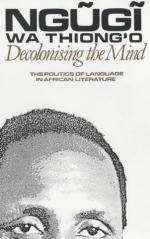
|
| Name: _________________________ | Period: ___________________ |
This quiz consists of 5 multiple choice and 5 short answer questions through Chapter 4 (Parts V-IX): "The Quest for Relevance".
Multiple Choice Questions
1. Who wrote The Wretched of the Earth?
(a) Gakaara wa Wanjaũ.
(b) Alan Paton.
(c) Frantz Fanon.
(d) Vladimir Lenin.
2. In his Introduction, the author states that the theme of this book is taken from a poem by what Guyanese poet?
(a) Wole Soyinka.
(b) Martin Carter.
(c) Gakaara wa Wanjaũ.
(d) Alan Paton.
3. Where did the capitalist powers of Europe carve up the continent of Africa into different colonies in the late 1800s?
(a) Paris.
(b) Berlin.
(c) Amsterdam.
(d) London.
4. What is the competition set to choose at the feast of thieves and robbers in Caitaani mũtharaba-Inĩ?
(a) The seven cleverest thieves and robbers.
(b) The three most effective of the thieves and robbers.
(c) The two wisest of the thieves and robbers.
(d) The two most humble of the thieves and robbers.
5. About how often was the Ituĩka ceremony held by the Agĩkũyũ?
(a) Every 30 years.
(b) Every 10 years.
(c) Every 25 years.
(d) Every 15 years.
Short Answer Questions
1. The author states in his Introduction that he will look at the African realities as affected by the great struggle between two opposed forces in Africa today. These are an imperialist tradition and what?
2. What novel of the author's is comprised of stories within stories in a series of flashbacks?
3. Who wrote Contes d'Amadou Koumba?
4. Who wrote the poem "Speech to Danish Working Class Actors on the Art of Observation"?
5. What was the first school that Ngũgĩ wa Thiong’o attended?
|
This section contains 271 words (approx. 1 page at 300 words per page) |

|




